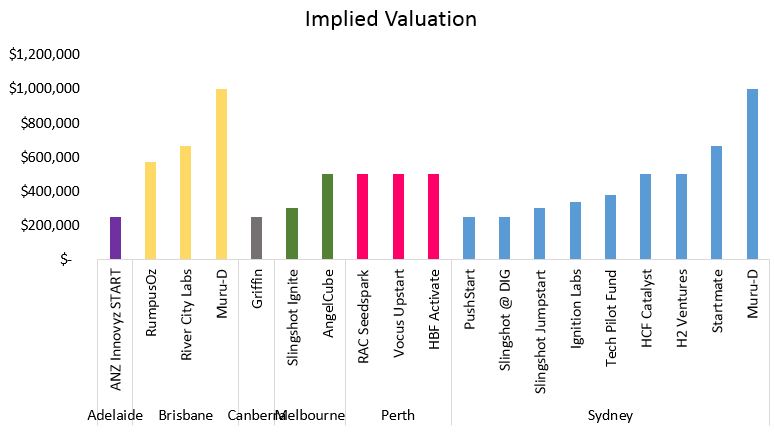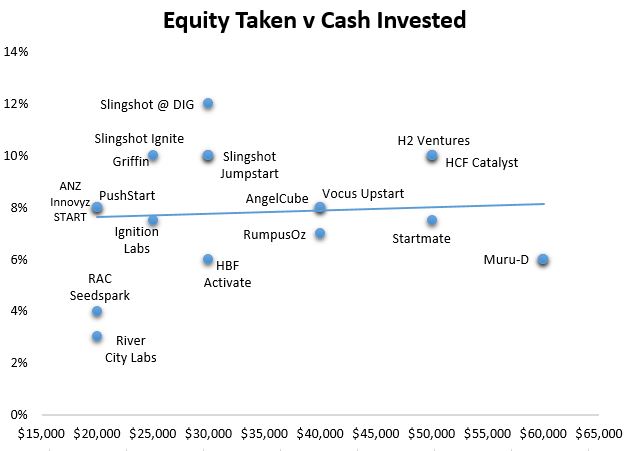Techboard’s Chief Data Nerd Rafael Kimberley-Bowen takes a look at the comparative valuations of Australian seed accelerators.
An accelerator is a cohort-based program which offers mentorship and education to startups to help set them up for solid growth once they complete the program. More specifically, a seed accelerator takes a small share of a startup’s equity in exchange for a modest capital injection and an educational program with access to mentors.
Typically the amount of equity taken and cash invested by each program is standardised, and the information is publicly available. This makes it relatively straightforward to compare the implied valuation offered by each accelerator. For instance, a program offering $50k in exchange for 10% equity is implicitly valuing every startup at $500,000 post-money.
Based on the above, Brisbane and Perth appear on average to offer slightly more generous valuations than other states – with Telstra’s Muru-D accelerator the most generous.
 In order to truly compare value in accelerators one would need to take into account the value of the education and mentors provided, not just the cash investment. Many of the programs also offer in-kind benefits alongside the cash, such as free hosting or other credits from partner organisations. So my analysis is technically incomplete in that it ignores these perks, and perhaps more importantly the differences in quality of each program’s educational component. But it would be just too hard to accurately value this.
In order to truly compare value in accelerators one would need to take into account the value of the education and mentors provided, not just the cash investment. Many of the programs also offer in-kind benefits alongside the cash, such as free hosting or other credits from partner organisations. So my analysis is technically incomplete in that it ignores these perks, and perhaps more importantly the differences in quality of each program’s educational component. But it would be just too hard to accurately value this.
And this is an important point. Decisions as to which program to apply for should not be based on the implied valuation as shown in this analysis. There are other more important considerations, such as the relevance of the mentor network to your business; and the program’s overall reputation. This post is more targeted at the analytically curious.
I’ve excluded some programs due to the difficulty in valuing the equity they take. For instance the Founder Institute model doesn’t offer a fixed dollar amount in exchange for equity in the startup, rather it takes a 3.5% stake which goes into a shared liquidity pool, which benefits all participants and mentors in the event of any one startup doing well. Equally, a lot of programs offer fantastic value by providing cash and education in exchange for no equity! These programs have also been excluded, as no valuation can be calculated.
The above graph plotting equity taken versus cash provided reveals an almost flat curve. This indicates than programs offering more cash don’t necessarily take more equity.
Data is sourced from www.f6s.com and from the programs’ own websites. This analysis was inspired by Mattermark’s report comparing accelerator valuations between countries (US, Canada, UK and Europe). Interestingly, that report found a similarly flat valuation curve for US accelerators.
The next step in the analysis is to rank accelerator programs by the number of successful exits achieved by their alumni, and the valuations at which these were achieved. In the US, the Seed Accelerator Rankings Project and Seed-DB both attempt to tackle this. It’s probably still too early in Australia to have enough meaningful data to compare programs along these metrics.

